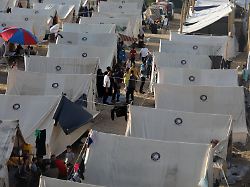Multi-front conflict is looming
Will war refugees from the Middle East soon come to Europe?
October 20, 2023, 11:45 a.m
In view of the bloody escalation in the Middle East, some politicians and commentators in Germany are wondering whether a new refugee movement to Europe can now be expected. However, the debate that has been going on for several days ignores some aspects, such as Egypt’s interests. Here are the most important questions and answers:
How is the debate going in Germany?
Although the arrival of refugees is not yet imminent, politicians from several parties have already expressed their opposition. CSU regional group leader Alexander Dobrindt told the “Rheinische Post” that the Arab neighboring states in the region are responsible for making preparations for the humanitarian care of the people from Gaza and the possible admission of migrants. However, a migration movement to Germany must be avoided.
SPD General Secretary Kevin Kühnert said at the beginning of the week that Egypt should do everything “that makes it possible to open the border crossing and admit civilians into Egyptian territory.” There is “no need” to accept people in Germany who are fleeing the Gaza Strip into Egypt.
AfD parliamentary group leader Alice Weidel demanded “a clear announcement from the Chancellery that Germany will no longer accept migrants from Gaza and the Middle East.”
The Green Party’s domestic politician Misbah Khan warns: “Hate and insecurities are the AfD’s political capital; it understands almost perfectly how to exploit these for its own purposes.” Right-wingers therefore fueled fears of refugee movements, spread anti-Semitic narratives and fueled hatred of Muslims and foreigners.
Is a mass exodus to Egypt likely?
Not yet. Egypt wants to open the Rafah border crossing to enable aid deliveries to the Gaza Strip. Negotiations are also underway as to whether people who have other citizenships will be allowed to leave the country via Egypt. However, President Abel Fattah al-Sisi strictly rejects the admission of possibly hundreds of thousands of Palestinians from the densely populated area in Egypt.
Al-Sisi argues, firstly, that there are security risks for his country if militant Palestinians make the Egyptian Sinai Peninsula the starting point for attacks on Israel. Secondly, with regard to previous refugee movements of Palestinians in the Middle East wars, he warns against “expulsion”. That means he fears that these people could be prevented from returning later. Many residents of the Gaza Strip are also people whose families lived in other parts of the former Mandatory Palestine before 1948.
What about Jordan?
People of Palestinian origin already make up a large part of the population there. The kingdom has also taken in refugees from Iraq and Syria. The willingness to accommodate more refugees is therefore low. At a meeting with Chancellor Scholz, Jordanian King Abdullah II drew a red line: there would be no further admission of Palestinian refugees.
How many people could make the journey?
That depends on the scale of the Israeli attacks in the Gaza Strip, which are a response to the terrorist attack by the Islamist Hamas on October 7th. Some observers fear that the Iranian-backed Lebanese Hezbollah militia could become a party to the war. In the long term, this could increase the flow of Lebanese and refugees living in Lebanon – both Palestinians and Syrians – to Europe. The country is already in a serious economic crisis. Furthermore, it cannot be ruled out that destabilization will occur in other Arab states as a result of mass protests.
“If there were to be a multi-front war, increased refugee movements from the region are of course to be expected,” says the chairman of the Expert Council for Integration and Migration (SVR), Hans Vorländer. The UN refugee agency would then be asked to find solutions for temporarily admitting these people.
What could – or should – Germany do in such a case?
The federal government is currently trying to prevent such a conflagration together with other Western actors. If there is a large refugee movement, a request could also be made to Europe to accept contingents, says Vorländer. The SVR expert suspects: “The negative attitude of some German politicians from the CDU/CSU, AfD and SPD, which I currently perceive, would then not be sustainable.” In such a case, however, fair distribution within the European Union would have to be guaranteed.
But it is also a fact that “the willingness of the population to accept is currently trending towards zero”. This is because there are already problems in the municipalities with the accommodation and care of refugees, but also because of rallies by pro-Palestinian groups in the past few days.
